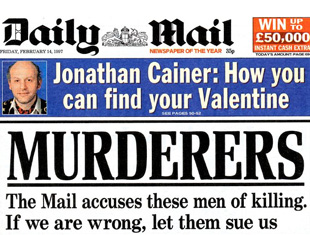Are the Lawrence convictions ‘glorious’ for journalism?
A “glorious day” for newspapers or the stuff of legal nightmares? Four media specialists talk to Channel 4 News about the Stephen Lawrence case and one of the most famous headlines in history.

An unlikely victor in the tragic case of Stephen Lawrence is the Daily Mail.
As two men, Gary Dobson and David Norris, are handed minimum jail terms of 15 and 14 years for the racist murder of the black teenager in 1993, the newspaper’s role in keeping the case alive for nearly two decades has been widely praised.
While Stephen Lawrence’s mother said this week’s outcome was “not a cause for celebration”, the paper’s long-serving editor Paul Dacre described it as “a glorious day for Neville and Doreen” and for campaigning journalism.
Mr Dacre famously published a front page in 1997 which branded Dobson and Norris “murderers” (pictured). It followed several attempts to bring Lawrence’s killers to justice.
“I wrote down with a thick pencil the word ‘Murderers’ and underneath it ‘The Mail accuses these men of killing, if we are wrong let them sue us’,” Dacre recalled.
“I showed it to the backbench sub-editors; there was a kind of nervous laughter.
“Contempt of court is drilled into every newspaper’s executive thinking – and this was contempt of a cosmic order. They obviously thought I was slightly mad.”
More from Channel 4 News: Stephen Lawrence timeline of events
It later transpired that Mr Dacre had hired Lawrence’s father Neville years earlier as a plasterer at his London home.
But he insisted it was the injustice he saw in the case which spurred him into action.
“For me it was the sickening sight on the TV news of those men strutting and staggering as they left the court… swearing, F-ing and blinding in defiance, it was the catalyst.”
Guardian writer Jonathan Freedland called the famous headline “the Mail’s finest hour” adding that it “helped make the case impossible to ignore”.
So after the phone-hacking scandal and a year of bad press for the press, is this a “glorious” moment for journalism?
Media analyst Douglas McCabe, from Enders Analysis, told Channel 4 News: “The Daily Mail’s headline and clear editorial line were both brave and also highly influential.
“They represented a good example of a popular press campaign that sustains interest in an important event or story, and in so doing helps articulate the collective beliefs and mood of the nation.
“The role and reputation of the popular press itself were enhanced through the Mail’s handling of this story.”
Solicitor Mark Stephens, who last year represented Julian Assange in his extradition battle, agrees that the Mail captured a national mood.
He told Channel 4 News: “There were a lot of people who felt it was astonishing that the Mail took this line – it was kind of counter-cultural for them.
“But Dacre has an almost umbilical connection with middle England and I think middle England understood that these men were thuggish yobs at best, racists at worst.
“This was good quality campaigning journalism which is really what a vibrant press should be about.”
So what about that 1997 front page – surely the stuff of media law nightmares?
It was insanity combined with genius. Ambi Sitham, lawyer
“It was insanity combined with genius,” says lawyer Ambi Sitham, who has since worked as a legal adviser to the Mail.
“I was a media law student at the time and I remember gasping when I saw that headline in the newsagent.”
“It was also one in the eye to those who claim he and the Mail are racist.”
Another media law specialist, Korieh Duodo, said “all press have a unique part to play in helping justice be done”.
He added: “The Mail should be commended on their story in 1997, but we all know they have a checkered history on issues to do with race, nationality, immigration.”
The Lawrence case led to the Macpherson Report into so-called institutional racism, and the legal change to enable people to be tried twice for the same crime – in other words, an end to the double jeopardy principle. It was a turning point for Britain.
Your view on Facebook.com/Channel4News
Danny Hill: There is no glory in this result, journalists ignored the police corruption which prevented a proper trial and conviction 18 years ago.
Lady Roisin: Nope, they should have dug deeper years ago - press should be ashamed of themselves.....
David Murphy: Eh, maybe the police should be ashamed of themselves.